Roanoke Bass Deep Water Fishing Information and Facts
Fly Fishing with wet flies can be a lot of fun, but this is a better technique when they are in the upper headwaters early on in the year.
The Roanoke Bass prefers the habitat of sunken logs, rocks, rock outcrops as well as riverbank outcrops and sunken debris from rocks, logs and even sunken boats. pretty much any underwater cover will do fine. They generally hover close to the bottom hidden away from sunlight in water temperature around 60°F to 70°F/15°C to 21C°.
In the spring, the Roanoke Bass can be found in the headwaters of the Roanoke river, Chowan river, Neuse river and the Tar river. As spring ends and summer heats up, they move out of the head waters and into slower, deeper moving water downstream. However, these are fresh water fish so they will never enter brackish water.
Winter Fishing
In the coming winter, the Roanoke bass will head even further into deeper water as the warmest water is at depth in the winter. Here they will more or less hover just above the bottom in a near suspended animation. This generally happens when the water temperature reaches below 50°F/10°C. The problem is that when the water temperature reaches below 5°0F, the Roanoke Bass is not active and eats very little and infrequently. One could hang a rod in the water and catch nothing all day. The best way to catch a Roanoke Bass in cold deep water is to appeal to predatory senses by encroaching on its territory. The key is to drop the bait within two feet of their position too close and it will spoke and scare them off.
If you fail to achieve any success and you know they are present, switch from baits to crankbaits, spoons and spinners. The great thing about these lures is that they replicate the sounds of a wounded fish and may provide better success in catching a Roanoke Bass.
Non-Winter Fishing
In the rest of the year, deep water is warm enough that the Roanoke Bass will strike any a simple small hook with an earth worm on the hook. Leeches and crayfish will get an instant strike, but these are really overkill. Minnows like the fathead or golden shiner are also great, but then again, dew worms are so much easier to keep and store for another day.
lures and effective, but not required in the warmer weather – and why risk getting a good lure snagged on a rock or sunken log.
Fly Fishing with wet flies can be a lot of fun, but this is a better technique when they are in the upper headwaters early on in the year. When in deeper water, it is not the most effective method when compared to bait casting.


